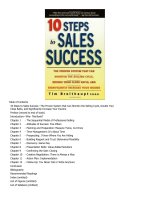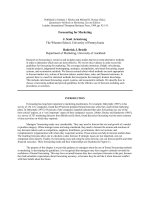The Blueprint for Motorcycle Sales Success pot
Bạn đang xem bản rút gọn của tài liệu. Xem và tải ngay bản đầy đủ của tài liệu tại đây (104.54 KB, 36 trang )
The
Blueprint
for Motorcycle
Sales Success
• Selling Skills • Business Skills • Internet Skills
© 2007 Salesperson, Inc.
by Mike Whitty
© 2007 Salesperson, Inc.
The Blueprint
for RV Sales Success
© 2008 Salesperson, Inc.
All rights reserved. No part of this program can be
reproduced in any form. The sole license to use
this program belongs to the purchaser, and
may not be shared.
Salesperson, Inc.
9312 Columbia St.
Redford, MI 48239
(800) 453-2787
Web Site: www.motorcyclesalestraining.net
Author: Mike Whitty
Editor: Irene McDonald, Ph.D.
Manufactured in the United States of America
Disclaimer
This book is written in the masculine
gender for ease of writing. Salesperson, Inc. or the author
have absolutely no bias to age or sex, and believes that
any person who applies himself to the study and
practice of motorcycle sales can and should
be successful.
© 2007 Salesperson, Inc.
© 2007 Salesperson, Inc.
© 2007 Salesperson, Inc.
Page 5
Section 1
The SALES Side of Selling New and Used RVs
TABLE OF CONTENTS
Introduction Page 21
Chapter 1
Philosophy of an Motorcycle Salesperson Page 23
Chapter 2
Philosophy of an Motorcycle Customer Page 25
Chapter 3
How to Get Started Page 29
Chapter 4
Greeting Page 33
Chapter 5
Qualifying Customers Page 39
Chapter 6
Inventory Walk Page 43
Chapter 7
Product Presentation Page 47
Chapter 8
Competitive Analysis Page 49
Chapter 9
Demo Ride Page 51
Chapter 10
Negotiation Page 57
— over —
© 2007 Salesperson, Inc.
Page 6
TABLE OF CONTENTS (cont)
Chapter 11
Objections and Closes Page 63
Chapter 12
Closing Techniques Page 69
Chapter 13
If You Don’t Sell the Motorcycle Page 77
Chapter 14
If You Do Sell the Motorcycle Page 81
Chapter 15
Pre-Delivery Inspection Page 85
Chapter 16
Delivery Procedure Page 87
Chapter 17
Switching to a Used Motorcycle Page 91
Chapter 18
Paperwork Page 96
Chapter 19
Organization Page 99
Chapter 20
How To Sell To Women Page 105
Chapter 21
How To Handle A Slump Page 109
Section 2
The BUSINESS Side of Selling New and Used RVs
TABLE OF CONTENTS
What is Motorcycle Salesperson, Inc.? Page 119
Money: Do You Know How To Make It? Page 121
Your Road To Success Page 123
Step
nn
nn
n
Evaluate Your Qualities As A Business/Salesperson Page 1271
Step
oo
oo
o
Determine Your Current Financial Situation Page 133
Step
pp
pp
p
Develop A Business Plan For A Strong Foundation Page 137
Step
q
Determine Strategies For Your Major Companies Page 167
Step
rr
rr
r
Develop Yourself A Marketing Strategy Page 191
Step
ss
ss
s
Write A Daily Plan Page 197
Step
tt
tt
t
Organize Yourself For Increased Productivity Page 201
— over —
© 2007 Salesperson, Inc.
Page 7
TABLE OF CONTENTS (cont.)
Step
uu
uu
u
Gain That Competitive Advantage Page 207
Step
vv
vv
v
Follow-Up To Develop Future Business Page 215
Step
ww
ww
w
Use A Computer To Develop Your Business Page 229
Finale Page 235
Page 8
© 2007 Salesperson, Inc.
Section 3
The INTERNET Side of Selling New and Used RVs
TABLE OF CONTENTS
Chapter 1
Understanding Internet Technology Page 241
Chapter 2
Internet Leads and Lead Providers Page 245
Chapter 3
Understanding the Internet Customer Page 249
Chapter 4
Developing an Internet Business Plan Page 253
Chapter 5
The Internet Specialist Page 257
Chapter 6
The Power of Email Page 263
Chapter 7
Understanding the Selling Process Page 271
Chapter 8
Email Direct Marketing Page 277
Page 9
© 2007 Salesperson, Inc.
Page 10
© 2007 Salesperson, Inc.
Preface
In every dealership, there are professionals who earn an outstanding income and there are
those who are starving. Often, the difference between sales superstars and average sales-
people does not come down to good looks, better education, more product knowledge, or
even knowledge of more sales techniques. It comes down to a professional mind-set and a
solid work ethic. Those who are proud of what they sell, the services they provide, and what
they do are vastly more successful than all others in the motorcycle industry.
In most dealerships, all salespeople receive the same training and learn the same sales
techniques. Given all of these similarities, how are some salespeople able to become sales
superstars and make an above average income, while so many other salespeople struggle
just to make their draw? The success of sales superstars goes beyond having good motor-
cycles to sell, knowledge of those vehicles, and knowledge of sales techniques.
$100,000 per year. Isn’t it amazing how many people throw that figure around in normal
conversation. You’re asked how much money you want to make this year, and you respond,
“I want to make over $100,000 per year. Like $100,000 per year is that magic figure that
everyone strives for, yet few people in the motorcycle sales industry attain.
According to the latest figures, the average income for a motorcycle salesperson is between
$35,000 and $42,000 per year. Now this is in an industry where you can conceivably make
unlimited income, sky’s the limit. Well, where is all this unlimited income? I’m here to tell
you, it’s out there. Someone is making it. Your job is to ask yourself, “why isn’t it me, and
how am I going to do it”.
A Business Without Any Investment
When you were hired into the dealership, they gave you a free desk, a free phone, a free
telephone answering service, a free advertising budget, and a million dollars worth of inven-
tory without any investment on your part. All they asked you to is go over to your desk and
run it just like it was your own business. That got to be the problem. Most salespeople don’t
know how to run a business. More importantly, most managers who hire salespeople don’t
take the time to teach them how to run it like a business. Many managers don’t know how
themselves.
But you’re surely not reading this to see how you can make $40,000 per year. If you pur-
chased this book based on the title alone, you’re obviously wanting more. And you should!
After all, you work in an industry where the hours are long, the rejection is high, and the pay
is unstable. With all that going against you, you deserve to make more money.
© 2007 Salesperson, Inc.
Page 11
But here’s the hard truth - most salespeople won’t reach that income pinnacle. Not because
they’re not nice, honest people, not because they don’t have the skills and talents, not be-
cause they weren’t trained and motivated, it’s because of one simple fact - they won’t do the
big work. If you want to make the big bucks, you have to do the big work.
Work Ethic is the Key
I was training in a dealership that had a salesperson working there for 14 years, making
$45,000 per year. And I asked him, “if I could show you some easy, no stress ways of mak-
ing more money, would you consider doing them?” And his response was, “Well, it all
depends on how much more work it will take me to do it.” And his response was typical of
many salespeople in our industry.
The typical salesperson will put in an average of two to three hours of productive work each
day. And by productive, I’m talking about “profit-generating” work. I started thinking, what
if I could get a salesperson to do four or five hours of productive work. Could I get this
person to make more money? My response was, “Yeah, he’d almost have to.” I truly believe
that a salesperson with a strong work ethic can make as much, if not more money that a
salesperson with a lot of talent. Talent is like knowledge. You can know everything there is
to know and have all the talent in the world, but if you never use it, what good is it. I’ve seen
many talented salespeople making $45,000 per year because they just didn’t have the work
ethic to back it up. I consider them “a waste of good talent”.
The idea of motorcycle salespeople making more money has become a very important issue
to me because I’ve realized, and I’m sure you’ve realized the same thing, that selling skills
alone will not necessarily take a salesperson from one financial level to the next. I mean,
let’s face it. Once you’ve been in the business for at least six months, you should pretty
much know all of the selling skills you’ll need to sell a motorcycle. And, if you haven’t
realized it yet, all of our customers know our selling skills too. They know they’re going to
come into the dealership and get greeted by a salesperson, you’re going to take them over to
your desk to ask them a few questions, show them a motorcycle, let them take it for a ride if
it’s allowed, come in and negotiate it, close it, deliver it, and hardly ever follow-up with
them. Not only that, internet customers are becoming a lot more prevalent. How much
selling skills does it take to sell an internet customer? They already know about the motor-
cycle, and they know the concept of buying over invoice. With all of this happening, how
are you going to make the type of money you desire?
The rule in our industry is, most salespeople get used to living on the money they make,
instead of making the type of money they want to live on. If you’re currently making
$35,000 per year, you get used to living on $35,000 per year. You buy or rent a $35,000
home, drive a $35,000 per year vehicle, eat at $35,000 per year restaurants, and go on
© 2007 Salesperson, Inc.
Page 12
$35,000 per year vacations, if you can even afford to go on a vacation without worrying
whether the electric bill is going to get paid that month. The fact is, there’s so much more
money to be made out there. And to get it, it’s not going to necessarily take more skills, but
it’s definitely going to take more work. How many of you would be willing to do a little more
work if you could make an extra $1000 per month? Well, here’s something I can guarantee
you. If you make an extra $1000 per month, you’ll know how to spend it.
Money Motivation
I want salespeople to be able to purchase all the things in life that money can buy. Someone
once said, “Money isn’t everything,” but it was probably said by someone who didn’t have
much in the first place. One of the reasons you got into motorcycle sales is because some-
one told you that if you got into motorcycle sales, you’d have the opportunity to make
unlimited income, sky’s the limit. And if you’ve been in the business for any length of time,
you already know someone, maybe even in your dealership, who is making six figures. Your
whole concept needs to be, “why shouldn’t it be me, and how am I going to make it?”
If you really want to make more money, you can. But not everyone wants to make more.
Some people can live very meagerly. As long as they can pay their bills, and have enough
left over for a movie once a month, and maybe a night out at a decent restaurant, they’re
happy. These individuals will have absolutely no use for information on how to make more
money. But if you’re the type of salesperson who likes “things”, this is the program for you.
Making more money means you need to become money motivated. You need to love the
money, and all the things it can buy. In fact, you should be working to buy things, not just to
pay bills. If you’re working to pay bills, you’re basically working to survive. I don’t want you
to just survive. I know that money won’t buy happiness, but believe me, money will buy you
a lot of things that will make you happy. Ask yourself this question: Is there something that
you want right now that you can’t have because you don’t make enough money? If there is,
you can have it. And it’s not going to necessarily take more skills, but it’s definitely going to
take more productive (profit-generating) work.
It’s Going to Take Change
Let’s begin your new thought process with this basic fact. If you’re currently making $40,000
per year and you want to increase it to $60,000 per year, something in the way you’re
currently doing business has to change. Because you can’t keep doing business the same
way as when you were making $40,000 and expect to increase your income. It’s like a
baseball player batting an average of 250 and wants to get up to 300. Something in his
swing has to change because he can’t keep swinging the bat the same way as he was batting
250 and expect to get up to 300.
© 2007 Salesperson, Inc.
Page 13
So, what can you change in the way you do business that can increase your sales and your
income? Here’s 10 to start with. Many of these will be discussed in greater detail further on
in the book.
Take more showroom customers (ups)
The worst thing a salesperson can do is pre-qualify a customer when he walks through the
door. I learned this early in my career when I let a customer walk by me because he didn’t
look like he could by a car. Another salesperson sold him and made a big commission.
From that point, I waited on everyone. Aside from pre-qualifying, take more ups. How many
more? That will be determined when you develop your business plan in the Business
Section.
Set more appointments on phone-ups
My rule on phone-ups is: if you’re not going to handle phone-ups properly, don’t take them
at all. Taking phone-ups is a privilege, not a right. Dealerships spend thousands of dollars
per month just to get people to call. If you choose to take a phone-up, your main goal
should not be to just give information, but to set an appointment.
Write-Up everyone
If a customer comes in for a brochure, write them up. Or if someone is just looking around,
write them up. It’s a proven fact that the more write-ups, the more sales. And even if they’re
not ready to buy, you will have all the information you need for future follow-up.
Work at getting more repeat and referral business
After 3-5 years of selling at the same dealership, your goal should be 60% repeat and referral
business. This means you need to nurture you’re customers throughout their ownership
period to virtually guarantee your success.
Sell more used motorcycles
If you primarily sell new motorcycles, you need to incorporate at least two used motorcycles
in your goals every month. Since a used motorcycle will generate more gross profit, this
could conceivably account for a third of your monthly income.
Become an expert
People like dealing with experts. And why would a salesperson who derives their income
based on product and competitive knowledge not want to be an expert? All it takes is study
and memorization to know everything about your vehicles, and everything about your
competitors.
© 2007 Salesperson, Inc.
Page 14
Networking for business
For as long as you’ve been selling motorcycles, could you conceivably have friends and
relatives who don’t know you sell motorcycles? How about people on your bowling leagues
or softball teams, anyone there don’t know you sell motorcycles? How about people you do
business with like your dry cleaners, your grocery stores, your gas stations, your pizza par-
lors, your insurance agents, anyone there don’t know you sell motorcycles? And if they
don’t, why don’t they? You should want everyone out there to know you sell motorcycles.
After all, you can provide them with the type of service they’d never receive anywhere else.
Learn to become a better negotiator and closer
When you look at your selling process, you don’t get paid for doing a greeting. You don’t get
paid for doing a qualifying. You don’t get paid for doing a product presentation. You don’t
get paid for handing them a brochure. What’s the only thing you get paid for? Closing the
sale. Yet negotiating and closing is the least area salespeople study and practice. A typical
salesperson will close 20% of his customers. That means 80% of his customers will not buy
for whatever reason. That’s quite a high percentage to not consider that maybe their closing
skills might not be up-to-par.
Practice, practice, practice
Tiger Woods is undoubtedly the greatest golfer in the world. He had the best swing in the
world as a Junior golfer. So when he became a pro, what did he do? Change his swing.
Because he knew that his childhood swing no matter how good it was would not sustain him
as a professional. After winning the 2000 Masters by 20 strokes, he changed his swing
again. Why? Because he knew that no matter how good he is, he can always be better.
When he finishes a round leading by 10 strokes, instead of going to the lounge to have a
drink with some friends, he goes to the driving range and putting green to practice. Why?
Because he knows that there’s always some little details to work on to keep him sharp. If
Tiger does all this when he’s already the best, shouldn’t you approach your career in the
same way? I know many salespeople who will go to the driving range and hit a thousand
balls to lower their score on the golf course. But for their own financial security, they won’t
practice at all? This doesn’t make sense to me. Repetition is the single most important factor
in becoming good at anything. So, practice, practice, practice!!
Sell more accessories
This is another income source that you’ll learn about in the Business Section. If your dealer-
ship allows all accessory sales to go into the gross profit, this will become an additional
income generator for you. I’ve seen many salespeople take a small deal and turn it into a
large deal by merely selling additional items that the customer probably already wants.
© 2007 Salesperson, Inc.
Page 15
So, now that you have an idea on what it will take to increase your sales, let’s take a look at
what you will learn in this book:
Section 1 - The SALES Side of Selling New and Used Motorcycles
To begin your rise to superstardom, it wouldn’t be right if you didn’t start with the
basics of
motorcycle selling. The first section of this book with take you through the
entire process, from the moment you step onto the showroom floor, to how to handle
a slump, and everything inbetween.
Section 2 - The BUSINESS Side of Selling New and Used Motorcycless
Next, you’ll be introduced to Motorcycle Salesperson, Inc., where you’ll continue
your education by learning how to “run your business like a business”. Here you’ll
get an indepth look at how to create your own company right from your desk, and
develop the skills that every businessperson needs to become successful.
Section 3 - The INTERNET Side of Selling New and Used Motorcycles
And last but not least, with Internet technology becoming a huge part of the
motorcycle selling business, you’ll be introduced to the best practices of converting
internet leads into sales, email marketing, and more.
So, welcome to your success in motorcycle sales. Your financial future is right at your
fingertips. All you need to do know is make it happen.
Let’s start with the Basics
The steps to the sale has not changed much over the years. But the one thing that has been
the difference between the superstar and the average salesperson is an expertise in the
fundamentals of selling.
When Tiger Woods first came on the tour, he already had wonderful fundamentals. Today,
Tiger’s fundamentals are almost perfect. Does that mean he doesn’t need to work on them?
Just the opposite. Tiger works on the fundamentals all the time.
And you should to. So, let’s get started!
© 2007 Salesperson, Inc.
Page 16
The SALES
Side of Selling
New and Used
Motorcycles
Section 1
© 2007 Salesperson, Inc.
© 2007 Salesperson, Inc.
Page 18
© 2007 Salesperson, Inc.
Page 19
Section 1
The SALES Side of Selling New and Used RVs
TABLE OF CONTENTS
Chapter 1
Philosophy of a Motorcycle Salesperson Page 5
Chapter 2
Philosophy of a Motorcycle Customer Page 17
Chapter 3
How to Get Started Page 21
Chapter 4
Greeting Page 27
Chapter 5
Qualifying Customers Page 33
Chapter 6
Inventory Walk Page 37
Chapter 7
Product Presentation Page 41
Chapter 8
Competitive Analysis Page 45
Chapter 9
Demo Ride Page 47
Chapter 10
Negotiation Page 53
Chapter 11
Objections and Closes Page 61
© 2007 Salesperson, Inc.
Page 20
TABLE OF CONTENTS (cont)
Chapter 12
Closing Techniques Page 67
Chapter 13
If You Don’t Sell the Motorcycle Page 75
Chapter 14
If You Do Sell the Motorcycle Page 79
Chapter 15
Pre-Delivery Inspection Page 83
Chapter 16
Delivery Procedure Page 85
Chapter 17
Switching to a Used Motorcycle Page 89
Chapter 18
Paperwork Page 93
Chapter 19
Organization Page 97
Chapter 20
How To Sell To Women Page 103
Chapter 21
How To Handle A Slump Page 107
Introduction
“There are two kinds of people,
those who do the work and those
who take the credit. Try to be in the
first group; there is less competition
there.”
Indira Ghandi
© 2007 Salesperson, Inc.
Page 21
Step-by-Step Sales
Walking from my car to the office recently, a thought
entered my mind — whether figuratively or literally, to
get from Point A to Point B you move one step at a
time. For example, to get from my desk to the copy
machine, I have to move back from my desk, stand,
walk through a hallway, open a door, and walk into
the office toward the machine. I have to do it precisely
in that order or I can’t arrive at my destination. It´s
impossible to do it otherwise. It´s impossible for me to
walk through the hallway without first moving back
from my desk and standing; I can´t walk into the office
without first opening and walking through the door.
Closing a Customer is the Same Thing
For every sales opportunity in your dealership, a sale
advances around a consistent process of selling steps.
Sure, every sales opportunity is a little different from
another, however, the overall process is always similar
within the motorcycle industry — especially when you
look at the major steps. For example, you can’t qualify
a customer until you first greet them. You can close a
customer until you first write them up. For each step
there is common criteria used to determine if you´ve
completed the current step and are ready to move
forward with the next sales opportunity. Different tactics are often used to accomplish each
step, however, the progression of steps rarely changes. Generally, the next step is fixed — a
greeting, qualifying, product presentation, demo ride, close, etc. We know what it takes to
complete each successive step and as such, this becomes a great way to determine and
measure the probability of your close.
Your Roadmap to Success
Do you have each sales step mapped out clearly? Do you have a plan thought through on
why each progressive step is necessary to close the sale? Do you know the procedures,
tactics and psychological methods typically taken to accomplish each step and the reasons
why they need to be accomplished in that order?
If you can´t truly understand the steps necessary to get from where you are in the sale to
where you ultimately need to be, the chances of getting there are just that — chances. Each
step in the process is necessary to accomplishing your goal of selling a
motorcycle. If you
take one step out of this proven equation, that step can become like the weakest link in a
strong chain.
The Weak Link
For example, every salesperson knows that an enthusiastic, feature/benefit presentation with
the customer is an important part of the process. It allows the salesperson to continue on
with the selling motivation needed before going into the close. This motivation and
enthusiasm began with a warm greeting, followed by a caring qualifying, now an exciting
presentation to get the propect wanting more and to see how the motorcycle will fit into their
budget.
But let’s say the salesperson did the warm greeting, the caring qualifying, then just let the
customer walk around the motorcycle on their own. What happens now? The motivation
and enthusiasm stops, the salesperson becomes unaware of what discussions are taking
place, the salesperson’s adrenalin has lowered, the customer comes back to the dealership
and all the salesperson can say is, “Well, how did you like it?” He doesn’t know because he
wasn’t there. And now the entire crescenda has to be built all over again. And, it’s usually
not. So he and the customer go into the close at the lowest peak of motivation. The
presentation became the weak link in the chain.
The longer a salesperson stays in the business, the easier it becomes to shortcut the
presentation. And that’s way many salespeople’s income never increase. They forgot what
got them there in the first place - the basics.
© 2007 Salesperson, Inc.
Page 22
Chapter 1
Philosophy of a Motorcycle Salesperson
Look out for the fellow who lets
you do all the talking.
— Frank Hubbard
Your reputation is determined by
what others are not thinking about
you.
— Tom Masson
© 2007 Salesperson, Inc.
Page 23
Being a motorcycle salesperson brings with it many
responsibilities, as well as rewards. Whether you are
thinking of making this your career, or whether you’ve
been a motorcycle salesperson for years, you will
realize that there is more to doing this job than the
average salesperson pursues. The whole purpose of
this book is to educate you on the proper sequence of
doing business.
So, what are the major objectives of the salesperson?
Simply stated, they are:
• TO SELL MOTORCYCLES AND MAKE MONEY
The primary reason and motivator for taking
any job, or starting a career, is to earn money.
After all, it would be difficult to purchase the
necessities of life without it. And, if you didn’t
desire a better than average lifestyle, you would
probably be satisfied to settle for a 9-to-5 job
earning minimum wage. But, this isn’t the case.
You’ve decided to enter a career where the
hours are long, the rejection is high, and the
pay in unstable. If I haven’t painted a pretty
picture thus far, it wasn’t my intention. Realize,
however, that along with the downside of this
profession, comes the opportunity to earn a
© 2007 Salesperson, Inc.
Page 24
tremendous amount of money. It has always been my philosophy that, if I am willing
to work a lot of hours and if I am willing to take a lot of rejection, then I want to be
earning a lot of money. And, where else can you virtually run your own business
without any capital investment? Motorcycle sales is one of the few occupations
where an individual can have millions of dollars worth of inventory, office space, a
telephone answering service, and an advertising budget—with no investment
whatsoever.
• TO REPRESENT THE COMPANY IN A PROFESSIONAL MANNER
Professionalism is not a word that should be taken lightly. When you become
involved in a “people business,” you have to make sure that the way you portray
yourself reflects kindly on your employer. The way you look, act, and handle your
affairs both inside and outside the dealership will determine the type of salesperson
you will become.
• TO CONTINUE LEARNING YOUR TRADE
A salesperson was asked, “How many years of experience do you have selling
motorcycles?” and his reply was ten years. Then the question was posed, “Do you
have ten years of experience, or one year of experience ten times?” What happens to
many salespeople is that whatever they learn during their first year in the business is
all they care to learn for the rest of their career, and so they remain stagnant. It should
not be like this. Times change, people change, the economy changes, and
motorcycles change. With all of these changes taking place, the salesperson should
take it upon himself to constantly upgrade his education in the career he is pursuing.
It stands to reason that if a person wants to become more proficient, he should never
stop learning.
There are, of course, many other philosophies for doing business such as, “treat others as
you would want to be treated,” but the main point to remember is that “success means
growth and growth means change.” Always strive to be the best salesperson that you can be,
and you will reap the rewards of your efforts.
Your reputation is determined by what others are not thinking about you.
—Tom Masson
Motorcycle Salesperson, Inc. is a program that
teaches salespeople to become better business people.
Many salespeople simply run their business by “hit or
miss.” They come to work in the morning, take what-
ever the dealership, the economy, or the manufacturer
has to give them, then leave the dealership at the end
of the day. But throughout that day they never do
anything to actually develop their business, and run
their business as if they actually owned it.
This is not a selling skills course.
Salesperson, Inc. has determined that increas-
ing a salesperson’s selling skills alone will not
give this individual the tools necessary to attain
that next level of success. Once a salesperson
learns the basic fundamentals of selling, or the
“10 Steps to the Sale”, additional business will
come from understanding the business aspect
of sales; all of those areas above and beyond
the basics that salespeople need to learn.
What if salespeople thought of themselves as business
people?
So I started looking at these salespeople sitting
at their desks and I asked myself, “if they had
overhead to pay, if they had employees to pay,
if they had to make sure their company profited
WHAWHA
WHAWHA
WHA
T IST IS
T IST IS
T IS
MM
MM
M
OO
OO
O
TT
TT
T
OROR
OROR
OR
CYCY
CYCY
CY
CLE SALESPERSON,CLE SALESPERSON,
CLE SALESPERSON,CLE SALESPERSON,
CLE SALESPERSON,
INC? INC?
INC? INC?
INC?
Thought:
The best way to predict
the future is to make the
future happen.
© 2007 Salesperson, Inc.
Page 25









